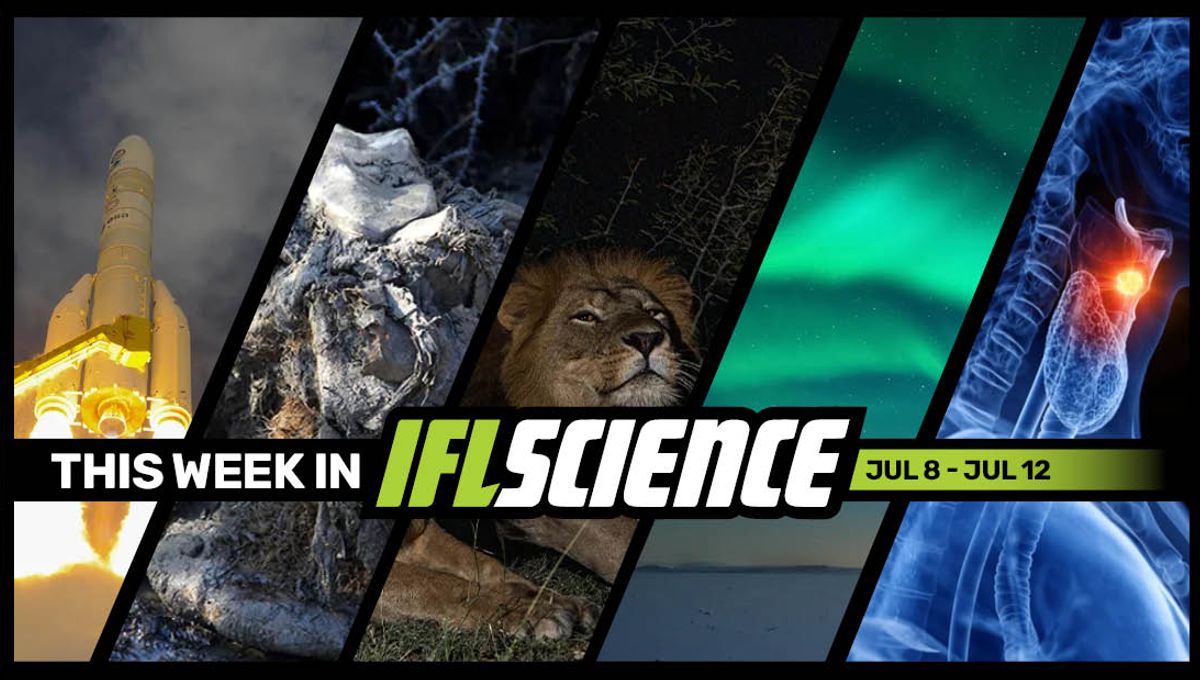
This week, 52,000-year-old “freeze-dried” mammoth skin delivers the first-ever set of 3D chromosomes, lion brothers swim a record-breaking distance across predator-filled waters, the first sighting of incredible “polar rain” from Earth finally has an explanation. Finally, we explore the world’s most endangered language, N|uu.
Subscribe to the IFLScience newsletter for all the biggest science news delivered straight to your inbox every Wednesday and Saturday.
Ariane 6, Europe’s New Way Into Space, Finally Takes Flight
The thing that gives you shivers is the sound. Despite light being faster, it’s the vibration of the rocket that makes you realize just what a big deal this is. You can see the light from the rocket in the sky, stunning without a doubt, but it’s in the following seconds as the soundwaves catch up with the view that you (the building, and the jungle of French Guiana) reverberate with the roar. Making that roar is Ariane 6, Europe’s new way to get to space, and IFLScience was right there at the launchpad in Kourou to watch it happen. Read the full story here
Woolly Mammoth Skin “Freeze-Dried” For 52,000 Years Delivers First-Ever 3D Chromosomes
Freeze-dried skin samples of a woolly mammoth found in Siberia have enabled scientists to create a 3D reconstruction of 52,000-year-old chromosomes. The achievement is a world first for ancient DNA and reveals which genes were active in the skin cells when the mammoth was alive. Read the full story here
Lion Swims Record-Breaking Distance Across Predator-Filled River In Movie-Worthy Epic Feat
When you think of a lion, what is the first thing that comes to mind? A catchy song from a Disney movie, their majestic roar, or maybe the similarities between these predators and the housecat curled up on your lap? What perhaps doesn’t enter your mind is the swimming prowess of these African beasts. Well, new research has revealed that these big cats might be swimming a whole lot more than we thought, as an epic, record-breaking feat demonstrates. Read the full story here
Incredible “Polar Rain” Aurora Seen From Earth For The First Time
On Christmas Day 2022, a highly peculiar aurora was seen over an enormous section of the Arctic sky, the likes of which have never previously been observed from the ground. Known as a polar rain aurora, this exceptional light show was produced by a waterfall of electrons that emanated from the Sun before cascading peacefully over the North Pole. Read the full story here
Cancer Patient Gets Total Larynx Transplant To Restore His Voice In World First
A 59-year-old man from Massachusetts has become the first known person to have received a total larynx transplant whilst having active cancer. Patient Marty Kedian has joined a very short list of people who’ve undergone this surgery in the past, with surgeons at the Mayo Clinic in Arizona hoping the procedure could soon be offered to more people who have lost their voices to cancer. Read the full story here
TWIS is published weekly on our Linkedin page, join us there for even more content.
Feature of the week:
N|uu, The World’s Most Endangered Language, Has Just One Fluent Speaker Left
With just one living fluent speaker, N|uu is one of the most endangered languages in the world. Its story is one of pain and tragedy – but also great hope and determination. Together with her family and local linguists, the last remaining speaker of N|uu is striving to keep the dying embers of the language aflame by passing it on to the new generation. Read the full story here
More content:
Have you seen our e-magazine, CURIOUS? It’s just turned 2! Issue 24 July 2024 is available now. Check it out for exclusive interviews, book excerpts, long reads, and more.
PLUS, season 4 of IFLScience’s The Big Questions Podcast has begun. So far we’ve asked “Why Are We The Only Surviving Human Species?” and “How Is Climate Change Impacting Our Health?”
Source Link: Ariane 6 Finally Takes Flight, Cancer Patient Gets Total Larynx Transplant To Restore His Voice In World First, And Much More This Week